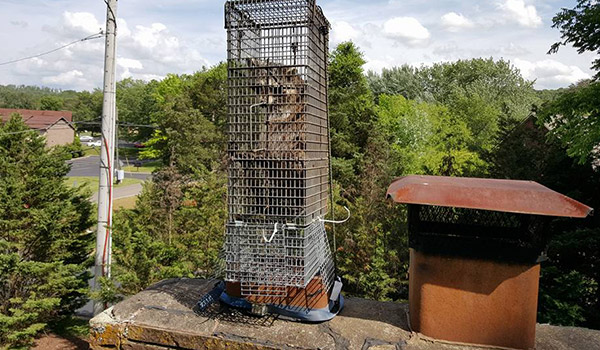How to get raccoons out of chimney

Raccoons will get into the chimney to build their nest there, and this is usually the case with pregnant female raccoons. They will stay in there until they raise the babies and prepare them for independent life. How can you know that you have a raccoon in a chimney? In most of the cases, you can almost be sure when you hear a scratching noise from the chimney. Of course, it is possible that it is some other rodent, such as squirrels, but in most cases a scratching noise will be produced by a raccoon looking for a new home – and the sounds that raccoons make are usually louder and noisier than squirrels, as they are larger animals than squirrels. Keep in mind that raccoons are great climbers, so once they get onto the roof of your house (probably over nearby tree branches), they are just one step away from the chimney or the attic. It is only a matter of which one is opened for access and subsequent nest creation.
The removal of a raccoon from a chimney first should include removal of a mother and then the babies. If you try to remove the babies first, the mother could attack you in order to protect them. This is the reason why the mother raccoon should be safely removed first. Removal of a raccoon includes usage of a special trapping system that includes a pole so a raccoon can safely be grabbed and picked from the chimney.
When the pole is long enough, the raccoon can be grabbed from the top of the chimney and safely removed outside of the house. After you remove a mother and babies, cover the chimney with the protective steel cover and seal it so that no rodent can ever again enter your home through the chimney. Wildlife means the undomesticated animals species and they are the animals that grow or live in the wild in the area where they were not introduced by the humans. The wildlife may be found in each ecosystem like the grasslands, plains, rain forest, forest and deserts. Even if the popular term should stand for the wild that has not been touched by the human factors but in most cases, the wildlife has been affected by the human activities. Whatever you do, don't start a fire because it can lead to either forcing the raccoons to run away into your house (where you have a fireplace) where it will be much more difficult and stressful (for both you and the raccoons) to get them out, or even worse, you can burn the raccoons alive and you surely don't want them to die such a horrible death.
Go back to the How To Get Rid of Raccoons home page to learn more about How to get raccoons out of the chimney.
|